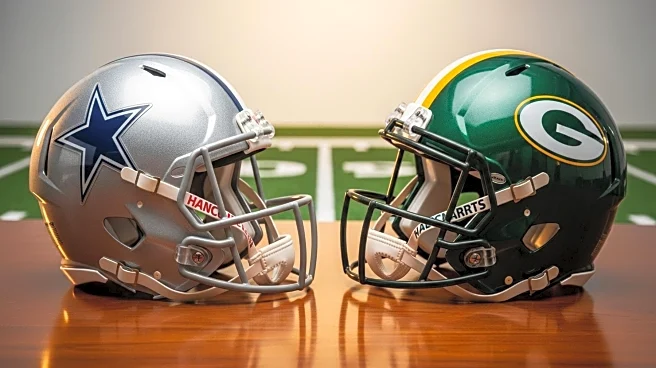What's Happening?
The Dallas Cowboys have traded star pass-rusher Micah Parsons to the Green Bay Packers. The trade was finalized after Parsons requested a move on August 1 due to stalled contract negotiations with the Cowboys. In exchange for Parsons, the Cowboys received defensive tackle Kenny Clark and two first-round draft picks. The Packers have signed Parsons to a four-year, $188 million contract. George Pickens, a wide receiver for the Cowboys, commented on the trade, stating that it was beneficial for both parties involved. Pickens himself was acquired by the Cowboys earlier this year in a trade with the Pittsburgh Steelers.
Why It's Important?
The trade of Micah Parsons marks a significant shift in the NFL landscape, impacting both the Dallas Cowboys and Green Bay Packers. For the Cowboys, losing Parsons, a four-time Pro Bowler, could affect their defensive capabilities. However, acquiring Kenny Clark and two first-round picks provides an opportunity to strengthen their roster in other areas. For the Packers, securing Parsons enhances their defensive lineup, potentially improving their chances in upcoming seasons. The move also highlights the complexities of contract negotiations in professional sports, where player demands and team strategies can lead to major trades.
What's Next?
Following the trade, the Cowboys will focus on integrating Kenny Clark into their defensive strategy and utilizing the acquired draft picks to bolster their team. The Packers will work on incorporating Parsons into their defensive schemes, aiming to maximize his impact on the field. Both teams will likely face scrutiny from fans and analysts as they adjust to these changes. The trade may also influence future negotiations and trades within the league, as teams reassess their strategies in light of this high-profile move.
Beyond the Headlines
The trade underscores the evolving nature of player-team relationships in the NFL, where contract negotiations can lead to unexpected outcomes. It also raises questions about the long-term implications for team dynamics and player loyalty. As teams increasingly prioritize strategic trades over traditional contract renewals, the league may see more high-profile players changing teams, altering the competitive balance.








